Snowden urges end to mass surveillance in Christmas message
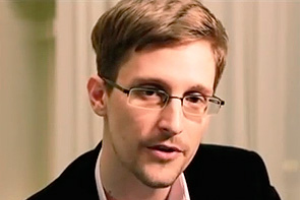 In his first television appearance since claiming asylum in Russia, Snowden -- who caused shockwaves around the world by revealing mass US electronic surveillance programmes -- will give a staunch defence of privacy in the short pre-recorded broadcast.
In his first television appearance since claiming asylum in Russia, Snowden -- who caused shockwaves around the world by revealing mass US electronic surveillance programmes -- will give a staunch defence of privacy in the short pre-recorded broadcast.
"Together we can find a better balance, end mass surveillance and remind the government that if it really wants to know how we feel asking is always cheaper than spying," he says.
Citing the classic dystopian novel "Nineteen Eighty-Four", he adds: "Great Britain's George Orwell warned us of the danger of this kind of information.
Read moreIsraeli ministers demand end to US spying, but Netanyahu lets revelations 'pass quietly'
 Top Israeli politicians want the US to stop "systematically spying" on Israel after revelations that the NSA intercepted emails of former top brass. Much to everybody's surprise, the Prime Minister’s Office has chosen to stifle the scandal, however.
Top Israeli politicians want the US to stop "systematically spying" on Israel after revelations that the NSA intercepted emails of former top brass. Much to everybody's surprise, the Prime Minister’s Office has chosen to stifle the scandal, however.
"The secret is out," Transportation Minister Yisrael Katz said on Sunday. "The US is systematically spying on the defense and diplomatic leadership here in Israel. Is this how friends treat each other?" Housing Minister Uri Ariel said on Israel Radio he expected the US to admit wrongdoing.
Read moreEdward Snowden pens an open letter to the people of Brazil
 National Security Agency leaker Edward Snowden wrote in a lengthy "open letter to the people of Brazil" that he's been inspired by the global debate ignited by his release of thousands of National Security Agency documents, and that the NSA's culture of indiscriminate global espionage "is collapsing."
National Security Agency leaker Edward Snowden wrote in a lengthy "open letter to the people of Brazil" that he's been inspired by the global debate ignited by his release of thousands of National Security Agency documents, and that the NSA's culture of indiscriminate global espionage "is collapsing."
In the letter, released widely online, Snowden commended the Brazilian government for its strong stand against U.S. spying. He said he'd be willing to help the South American nation investigate NSA spying on its soil, but could not fully participate in doing so without being granted political asylum, because the U.S. "government will continue to interfere with my ability to speak."
Read moreNSA reportedly collects 5 billion cell phone location records a day
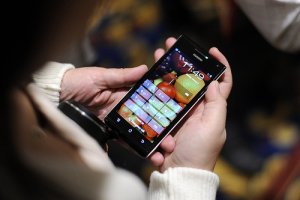 The NSA collects nearly 5 billion records a day on the locations of cell phones overseas to create a huge database that stores information from hundreds of millions of devices, including those belonging to some Americans abroad.
The NSA collects nearly 5 billion records a day on the locations of cell phones overseas to create a huge database that stores information from hundreds of millions of devices, including those belonging to some Americans abroad.
Documents provided to the Post by NSA leaker Edward Snowden detail how this database is able to track people worldwide and map out their relationships with others. The NSA inadvertently gathers U.S. location records, along with the billions of other records it collects by tapping into worldwide mobile network cables.The database and projects designed to analyze it have created a mass surveillance tool for the NSA, allowing it to monitor individuals in a way never seen before.
Read moreAustralian Special Forces offered U.S. confidential data about their fellow citizens.
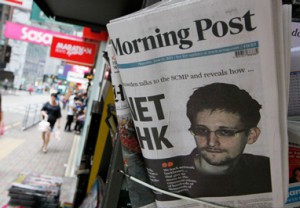 In 2008 Australian intelligence agencies offered to share the confidential information about Australians with the U.S. It was reported by the Australian edition of The Guardian newspaper, referring to the new documents submitted by Edward Snowden.
In 2008 Australian intelligence agencies offered to share the confidential information about Australians with the U.S. It was reported by the Australian edition of The Guardian newspaper, referring to the new documents submitted by Edward Snowden.
According to the newspaper, it is a previously unknown cooperation page of the five countries intelligence that makes up the so-called Group of Five Eyes (“Five Eyes”). Besides the U.S. and Australia, it includes Canada, United Kingdom and New Zealand. As it was previously reported, the purpose of the contract of Five Eyes is not only spying on terrorists, its main task is to collect political, diplomatic and economic information.
Read moreMalaysia summons Singapore ambassador over spying concerns
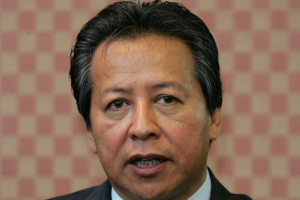 Malaysia's government has summoned Singapore's high commissioner for talks, saying it was "extremely concerned" by reports the city-state helps Western intelligence agencies spy on the region.
Malaysia's government has summoned Singapore's high commissioner for talks, saying it was "extremely concerned" by reports the city-state helps Western intelligence agencies spy on the region.
Media reports citing documents leaked by former US National Security Agency (NSA) contractor Edward Snowden put Singapore - a key US ally - at the centre of a spy network that reportedly taps undersea cables.
Citing documents leaked by Mr Snowden, Australia's Sydney Morning Herald said Singapore military intelligence helped US, British and Australian spy agencies harvest data passing through a major undersea cable called SEA-ME-WE 3, which is part-owned by Singapore Telecommunications (SingTel).
Read moreNSA infected 50,000 networks with specialized malware
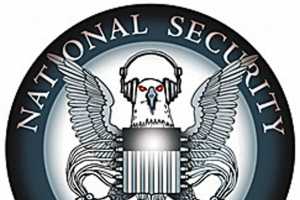 The U.S. National Security Agency reportedly hacked into over 50,000 computer networks around the world as part of its global intelligence gathering efforts, and also taps into large fiber optic cables that transport Internet traffic between continents at 20 different major points.
The U.S. National Security Agency reportedly hacked into over 50,000 computer networks around the world as part of its global intelligence gathering efforts, and also taps into large fiber optic cables that transport Internet traffic between continents at 20 different major points.
The agency installed specialized malware referred to as "implants" on over 50,000 devices in order to perform Computer Network Exploitation (CNE), Dutch newspaper NRC Handelsblad reported Saturday based on documents it said were leaked by former NSA contractor Edward Snowden.
Read moreLatest Snowden leak reveals NSA’s goal to continually expand surveillance abilities
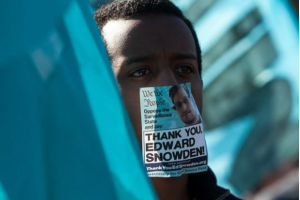 In a mission statement last year the US National Security Agency described how it would continue to expand its power and assert itself as the global leader in clandestine surveillance, according to a new report based on the Edward Snowden leaks.
In a mission statement last year the US National Security Agency described how it would continue to expand its power and assert itself as the global leader in clandestine surveillance, according to a new report based on the Edward Snowden leaks.
The five-page document brought to light Friday by the New York Times reveals the intelligence agency’s intention to “aggressively pursue legal authorities and a policy framework mapped more fully to the information age. ” The spy agency sought the ability to trace “anyone, anywhere, anytime,” according to its 2012 mission statement. Dated February 2012, the memo was written after PRISM and many of the other programs.
Read moreSnowden Slams U.S. NSA and British GCHQ for Uncontrolled Surveillance
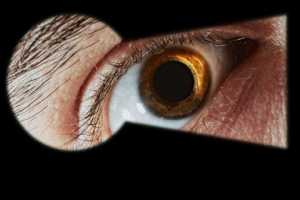 In an open letter published on November 3 by the German news magazine Der Spiegel, whistleblower Edward Snowden accused the U.S. National Security Agency (NSA) and its British counterpart (GCHQ) of being among the “worst offenders” engaged in uncontrolled mass surveillance.
In an open letter published on November 3 by the German news magazine Der Spiegel, whistleblower Edward Snowden accused the U.S. National Security Agency (NSA) and its British counterpart (GCHQ) of being among the “worst offenders” engaged in uncontrolled mass surveillance.
In his letter, entitled “A Manifesto for the Truth,” Snowden wrote: “The world has learned a lot in a short amount of time about irresponsibly operated security agencies and, at times, criminal surveillance programs. Sometimes the agencies try to avoid controls.”
Read moreBarack Obama approved tapping Angela Merkel's phone 3 years ago
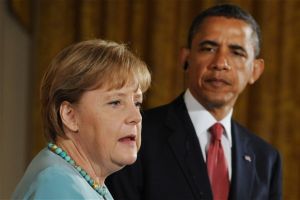 President Barack Obama was told about monitoring of German Chancellor in 2010 and allowed it to continue, says German newspaper. President Barack Obama was dragged into the trans-Atlantic spying row after it was claimed he personally authorised the monitoring of Angela Merkel’s phone three years ago.
President Barack Obama was told about monitoring of German Chancellor in 2010 and allowed it to continue, says German newspaper. President Barack Obama was dragged into the trans-Atlantic spying row after it was claimed he personally authorised the monitoring of Angela Merkel’s phone three years ago.
The president allegedly allowed US intelligence to listen to calls from the German Chancellor’s mobile phone after he was briefed on the operation by Keith Alexander, director of the National Security Agency, in 2010.
Read moreAxarhöfði 14,
110 Reykjavik, Iceland















